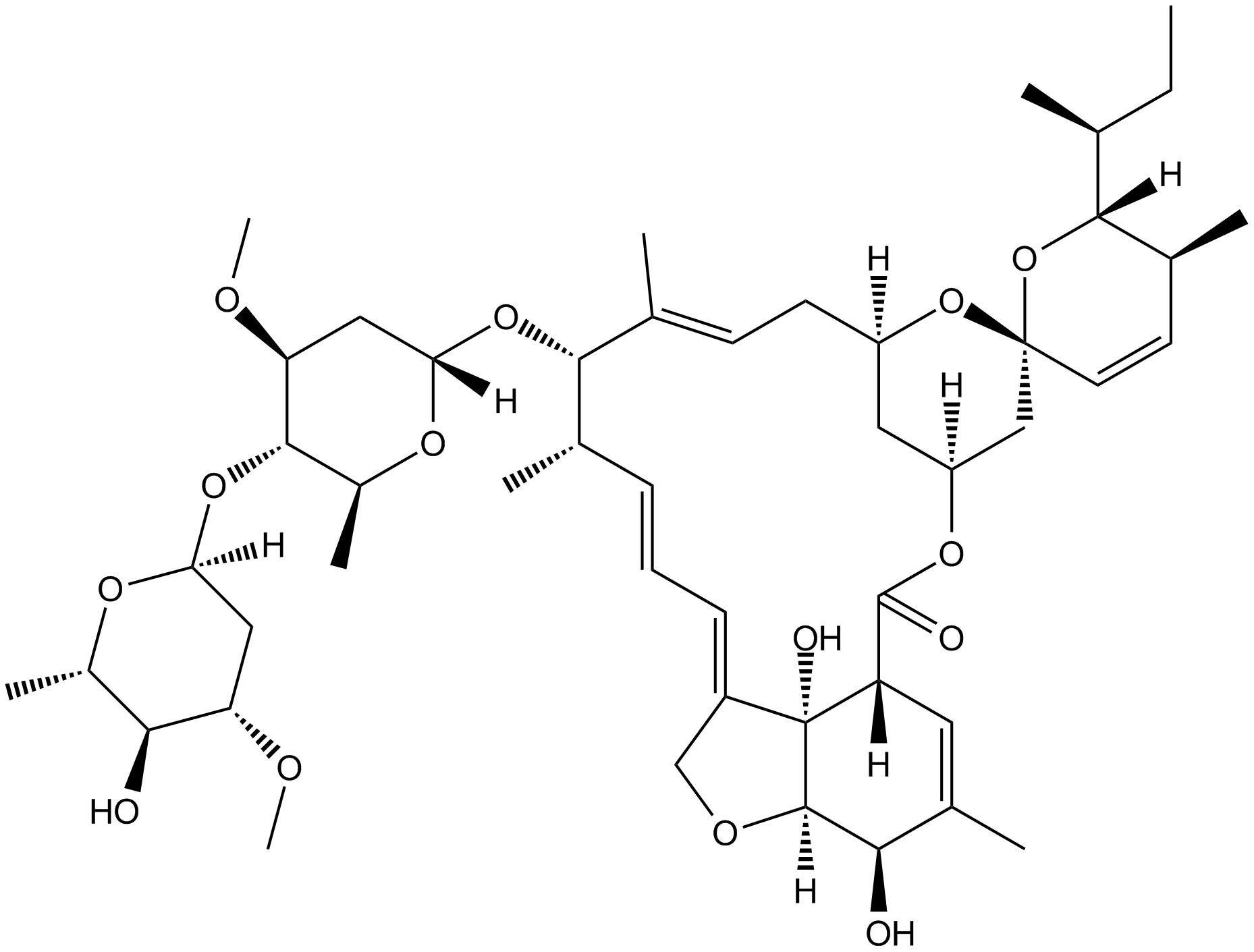Avermectin B1a (Synonyms: Abamectin B1a, Antibiotic C 076B1a, L-676,863) |
| Katalog-Nr.GC14872 |
An anthelmintic and insecticidal agent
Products are for research use only. Not for human use. We do not sell to patients.

Cas No.: 65195-55-3
Sample solution is provided at 25 µL, 10mM.
Avermectin B1a is a modulator of gamma-aminobutyric acid (GABA)-controlled chloride ion channels [1].
Avermectin B1a is a macrocyclic lactone derivative and possesses anthelmintic and insecticidal activities. It was obtained from the fermentation products of Streptomyces avermitilis. Avermectin B1a is usually worked as an anthelmintic and insecticidal agent. It suppresses the signal transmission of nematodes from the central command interneurons to the peripheral motoneurons. The mechanism of this action is that avermectin B1a can enhance the effects of glutamate on the gamma-aminobutyric acid (GABA)-controlled chloride ion channels, causing an influx of chloride ions into the cells. It subsequently leads to hyperpolarisation and subsequent paralysis of the neuromuscular systems. The excitatory effects can be reversed by the chloride ion channel blocker picrotoxin. Since mammals do not have this kind of ion channels, avermectin B1a has no toxicity for mammals [1 and 2].
In rat brain synaptic membranes, avermectin B1a significantly enhanced GABA binding up to 80% over control at concentration of 7 μM. Avermectin B1a also showed protection efficacy for GABA receptors from denaturation when the synaptic membranes were incubated at 60° C with 50 mM Tris-Cl. In the lobster stretcher muscle, treatment of avermectin B1a resulted in the block of IPSPs and the reduction of EPSPs. Besides that, avermectin B1a was found to have promoting effects on benzodiazepine binding. It enhanced flunitrazepan binding to synaptic membranes with EC50 value 50-fold lower than that of GABA [3 and 4].
When given to cattle, the oral administration of avermectin B1a at dose of 0.1 mg/kg reduced more than 95% of T. colubriformis, T. axei, Haemonchus placei, C. oncophora, Cooperia punctate, Ostertagia ostertagi, Oesophagostomum radiatum and Dictyocaulus viviparus. When given to sheep at the same dose, avermectin B1a administration caused also 95% above reduction of Trichostrongylus axei, Haemonchus contortus, Cooperia oncophora, Trichostrongylus colubriformis, Ostertagia circumcincta and Oesophagostomum columbianum [5].
References:
[1] Wang C C, Pong S S. Actions of avermectin B1a on GABA nerves. Progress in clinical and biological research, 1981, 97: 373-395.
[2] Bloomquist J R. Toxicology, mode of action and target site-mediated resistance to insecticides acting on chloride channels. Comparative Biochemistry and Physiology Part C: Pharmacology, Toxicology and Endocrinology, 1993, 106(2): 301-314.
[3] Pong S S, DeHaven R, Wang C C. A comparative study of avermectin B1a and other modulators of the gamma-aminobutyric acid receptor. chloride ion channel complex. The Journal of Neuroscience, 1982, 2(7): 966-971.
[4] Fritz L C, Wang C C, Gorio A. Avermectin B1a irreversibly blocks postsynaptic potentials at the lobster neuromuscular junction by reducing muscle membrane resistance. Proceedings of the National Academy of Sciences, 1979, 76(4): 2062-2066.
[5] Egerton J R, Ostlind D A, Blair L S, et al. Avermectins, new family of potent anthelmintic agents: efficacy of the B1a component. Antimicrobial Agents and Chemotherapy, 1979, 15(3): 372-378.
Average Rating: 5 (Based on Reviews and 30 reference(s) in Google Scholar.)
GLPBIO products are for RESEARCH USE ONLY. Please make sure your review or question is research based.
Required fields are marked with *




















